Tooth extraction is a standard procedure performed by dentists and oral surgeons. There are several reasons a tooth might need to be extracted, but the most common is if it has suffered irreparable damage. Find out more about dental tooth extraction and tooth extraction cost.
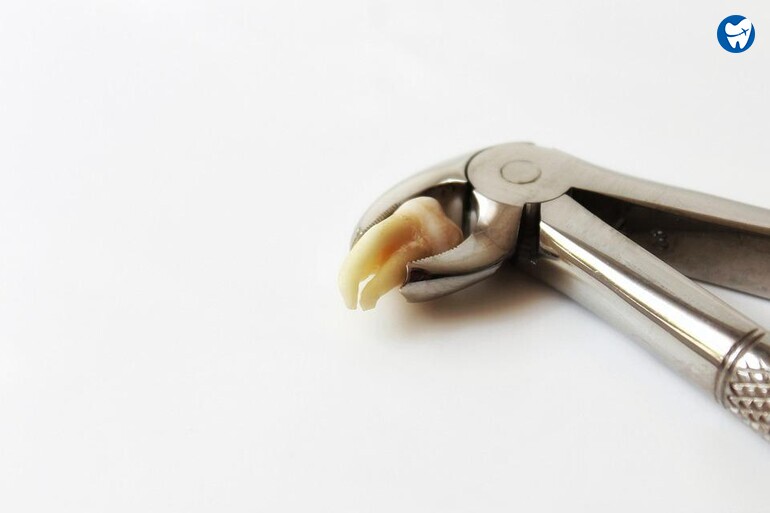
Dental Tooth Extraction
Tooth Extraction – Types, Costs, and More!
Dentists and oral surgeons perform tooth extractions for many reasons.
The costs depend on the type of procedure: simple vs. surgical, and several other factors.
The surgery type also affects the length of the procedure and its recovery.
Tooth removal – At a glance
- There are 2 types – Simple and Surgical
- The type affects tooth extraction cost
- In most cases, a dentist will carry out an extraction in one visit
- Length of the procedure varies 10 – 20 mins (for simple), 30 – 60 mins (for surgical)
- Recovery varies from 2 – 3 days for a simple extraction to 7 – 10 days for complex or multiple extractions
Why Do Dentists Extract Teeth?
A tooth is extracted when a tooth has a poor or hopeless prognosis.
Before resorting to tooth removal, a dentist will always try restorative treatments such as:
✅ Dental fillings
✅ Partial restoration
✅ Dental Crowns
✅ Root canal (endodontic) treatment
So, when dentists decide to remove a tooth, it’s because other avenues of restoration are exhausted.
The most common reasons for extracting teeth include:
- Trauma
- Loose teeth
- A dead tooth
- Infection, large cavities
- Tooth overcrowding
- Impaction [1]
Teeth that have suffered trauma or an impact may need emergency removal if they cannot be salvaged.
On the other hand, dentists will often remove overcrowded teeth before carrying out orthodontic work.
Finally, when there isn’t enough room in the mouth, wisdom teeth can erupt crookedly (impaction).
Wisdom teeth removal is among the most common forms of dental surgery. [2]
How Much Does Tooth Extraction Cost?
The average cost of a simple, non-impacted, chair-side extraction in the US falls somewhere between $75 – $300.
Alternatively, a more complicated surgical extraction using additional anesthesia costs between $150 – $650 per tooth.
Complex surgical tooth extractions cost upwards of $600. The cost of multiple wisdom tooth extraction averages out at $1,900 for all four teeth.
There are also a host of other factors that dictate the price of dental tooth extraction, including:
- An initial examination and x-rays
- Additional sedation
- The expertise of the dentist
The Average Cost of a Tooth Extraction Without Insurance
| Procedure | US | Canada | Australia |
| Simple | $75 – $300 | $130 | $125 |
| Surgical | $400 – $600 | $200 | $260 |
*Note: All prices are a rough guide without insurance and are costed in USD.
High costs at home pulling out your savings?
Save ~80% overseas!Simple vs. Surgical Tooth Extraction and Their Costs
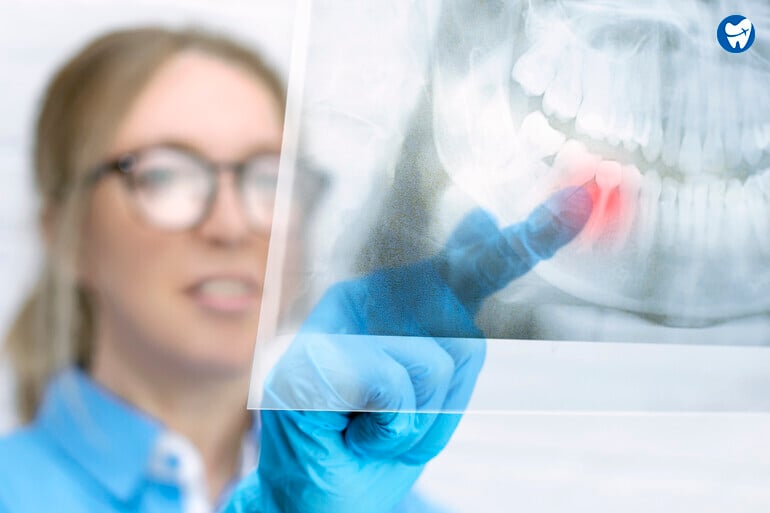
Full Mouth X-ray taken before extraction
As already stated, there are two types of tooth removal – simple and surgical.
They are relatively straightforward and are carried out in the dental chair at your dental office.
Typically, simple extractions only require a local anesthetic and are performed on visible intact, loose, or dead teeth.
Sometimes dentists will remove baby teeth if they are likely to be a problem. Procedures like these are also classed as simple extractions.
Most general dentists provide this service. The discomfort and healing times are likely to be minimal.
If a patient is anxious or nervous, a dentist might suggest dental sedation such as nitrous oxide (laughing gas) or oral medications to help.
Bear in mind that this extra service will add to the overall tooth removal cost.
They are different due to their complex and invasive nature. General dentists are capable of performing surgical extractions.
Oral surgeons handle the most complicated cases and sometimes perform the procedures in a hospital setting.
Your dentist will determine whether you require simple or surgical tooth extraction based on the following factors: [5]
- How much of the tooth is impacted (below the gum line)
- Whether the tooth is damaged
- Anatomy of the tooth
- If a tooth has broken off at the gumline
So How Much Is Teeth Surgery?
As the tooth is removed from the jawbone, you will be advised to rest for proper recovery. [6]
The cost for which varies from $75 – $300.
So How Much Is a Molar Extraction?
You can expect to pay anywhere between $75 and $200 per tooth (fully erupted) without insurance. [7]
The cost of a tooth extraction depends upon the complexity of the situation.
For an impacted tooth, difficult anatomy, or gross destruction of the tooth, the price varies from $400 – $600.
Tooth Extraction: Procedure
Tooth Extraction Procedure
After Tooth Removal – The Recovery Process
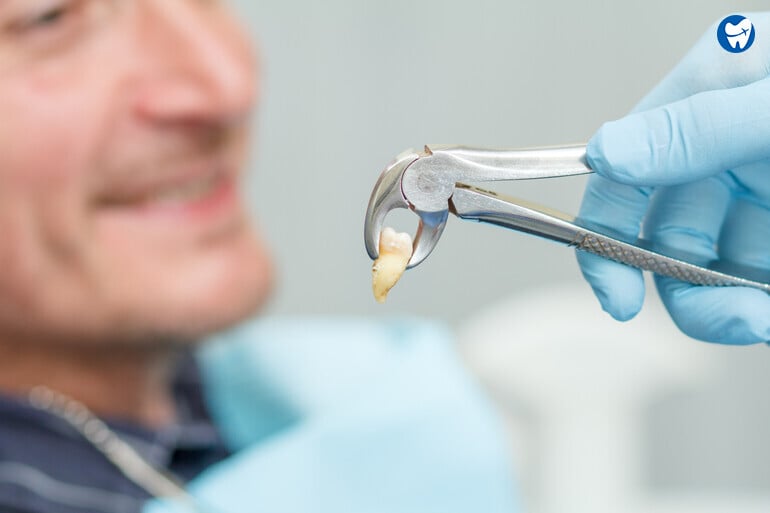
After Tooth Removal – The Recovery Process
Recovery after tooth extraction [8] typically takes a few days – but it can take longer.
| Here’s what you might expect: | You will also need to: |
| Bleeding within the first hour or so after extraction | Follow a care regimen provided by your dentist |
| Mild swelling after complex surgical extraction | Avoid strenuous exercise for 7 – 10 days |
| Tenderness & discomfort should ease after 2 – 3 days | Take prescribed antibiotics or medications |
If pain or symptoms persist after one week, contact your dentist immediately.
Dental Tooth Extraction Aftercare
Proper and effective care after tooth removal prevents unnecessary complications or discomfort.
Here’s what you need to do in the coming hours and days after removing a tooth. [9]
The first 24 hours
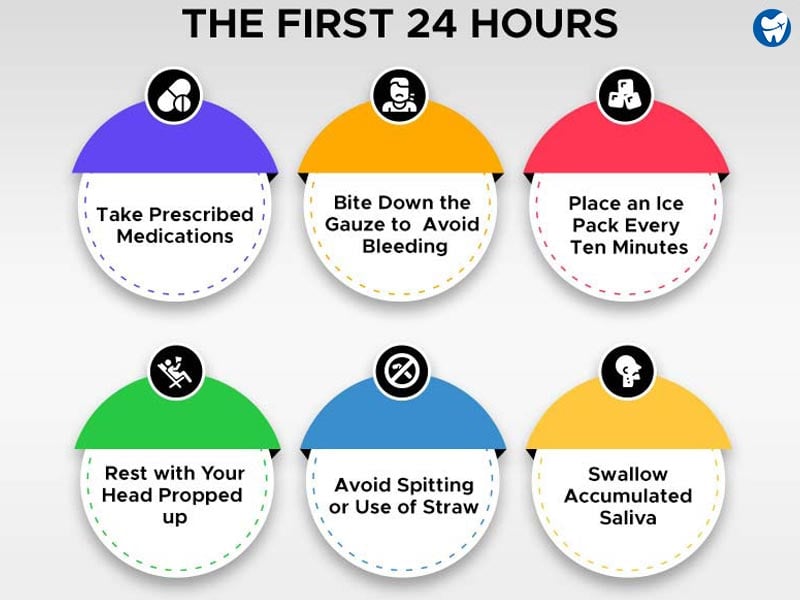
Dental Tooth Extraction Aftercare: First 24 Hours
The day after and beyond
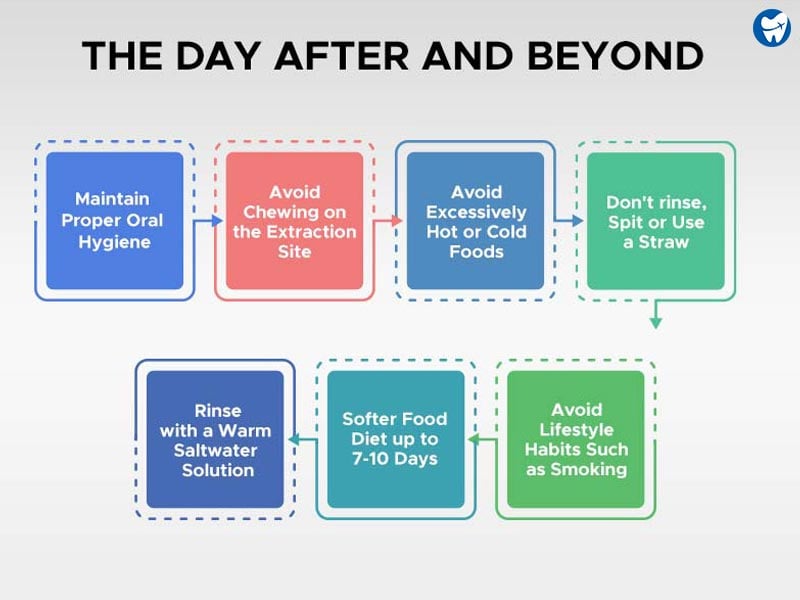
Dental Tooth Extraction Aftercare: After Few Weeks
Tooth Extraction Complications
If a dental tooth extraction is not managed in the right way, complications can arise. Problems include:
A dry socket occurs in 2 – 5% of all tooth extractions and up to 30% of all lower wisdom tooth extractions. [10]
They happen when the protective blood clot fails to form at the extraction site or becomes dislodged, leaving the area’s bone exposed.
Complications like dry sockets can cause significant discomfort, starting 2 – 3 days after the extraction process. [11]
Common symptoms of a dry socket include
- The visible bone at the extraction site
- Gray-colored tissue around the site
- A foul-smelling odor emanating from the mouth
- The intense pain from the tooth socket to the neck, ear, or eye temple on the same side as the extraction
Treatment involves rinsing the area and covering it with medicinal paste that forms a protective barrier.
Infection occurs when bacteria enter the open wound at the extraction site.
An infection left untreated can lead to a life-threatening condition called sepsis. [12]
Hopefully, this guide has given you all the information you need about dental tooth extraction and tooth extraction cost.
But just in case we’ve missed anything, check out some of the most commonly asked questions below.
Conclusion
Over ten million dental tooth extractions are undertaken every year by dentists and oral surgeons. So it is a safe, comfortable, and well-rehearsed procedure.
Hopefully, this guide has helped you figure out if you need a tooth extraction, what to expect and how much it costs.
FAQs
Here are some top tips if you want to know how to speed up recovery after tooth removal.
- Avoid strenuous exercise: Too much head movement is not suitable for recovery during the first few days.
- Don’t touch the site: Avoid poking the extraction site; otherwise, you may dislodge the blood clot.
- Refrain from smoking or drinking alcohol until fully recovered.
Chew carefully: Chew on the opposite side to the extraction and do so with care. - Sip drinks gently but avoid using a straw: Sucking may dislodge the blood clot.
- Ensure you take any painkillers and antibiotics as prescribed.
Avoid mouthwash: Instead, rinse with a saltwater solution.
Up to 2 – 3 days after a simple extraction and up to 7 – 10 days after, for more complex extractions.
In the meantime, you should easily be able to keep any discomfort under control using prescribed painkillers.
If discomfort persists after this time or the pain is particularly bad, contact your dentist for help.
Until the extraction site has fully healed, you can expect a risk of dry socket.
Healing can take 7 – 10 days in some cases.
During this time, take the necessary precautions to avoid a dry socket problem.
Healing time differs from patient to patient. You should expect a simple tooth removal to heal in 1 – 3 days fully.
Surgical or complex multiple tooth extractions, on the other hand, take 7 – 10 days to heal on average.
Yes. When a dentist cannot save a tooth, insurance will usually cover 50% – 80% of the treatment.
With the help of dental insurance, the average cost of tooth extraction is $35 for a simple extraction and $400 for a surgical extraction.
Take a vacay to prevent decay!
Plan my trip!


